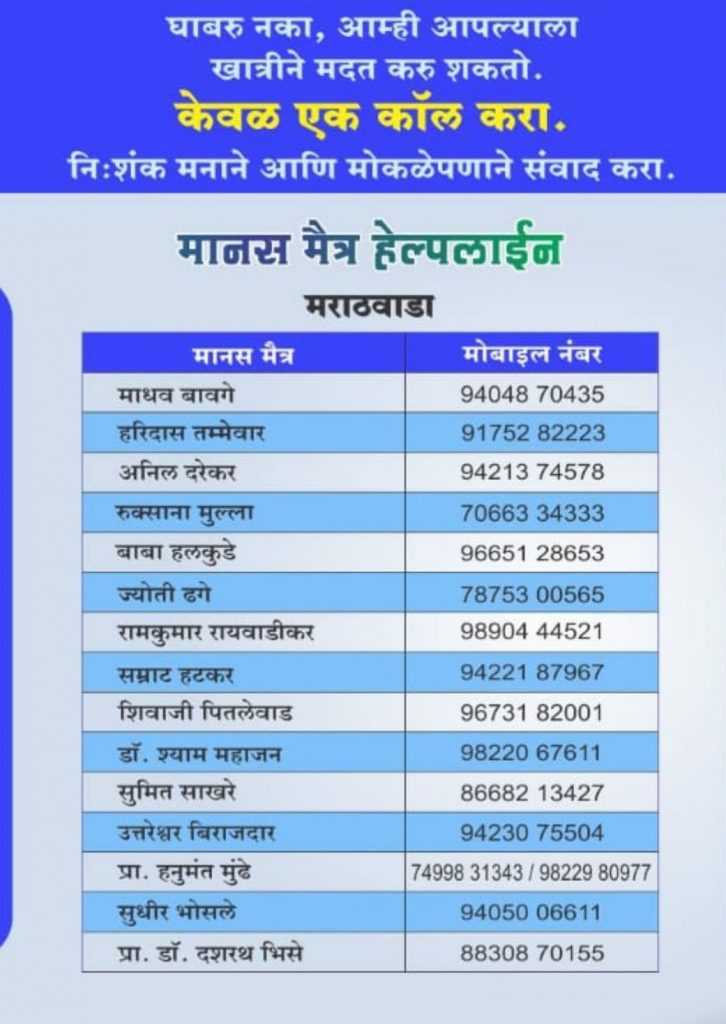 Today we would have been at Bombay Hospital.
Today we would have been at Bombay Hospital.
No, not admitted to it as patients but at its magnificent S P Jain Auditorium, gathered from distant corners of the country for our 5th National Conference to mark World Bipolar Day (which falls on the 30th of March). The COVID-19 pandemic had other ideas.
Of course, the scuttling of our enthusiastic, collectively drawn up plans for this conference was a big dampener. However, in the context of disruption and devastation the pandemic has wreaked across the world, this should be seen as just a small setback, not comparable with the unimaginable challenges millions all over the world are facing.
Talking about the COVID-19 pandemic, there is no question about why it is in the spotlight.
Let’s not dwell on the gruesome, scary data about the damage that it is causing in terms of persons infected and persons who have succumbed to it. Let’s refrain from reducing this tragedy to just numbers, even if these numbers are staggering. We are facing a health crisis without parallel in the modern era.
Entire nations have been placed under unprecedented lockdowns.
And the lockdowns have caused massive disruption. The repercussions on the economy are immediate and telling. The underprivileged are the ones who are most vulnerable in this crisis. In a nation like India, a large part of its population is from the unorganised sector. Hundreds of thousands of daily wage earners, migrant labourers have been left stranded without a means to earn a living and far away from their native states.
Then there are those with specific and serious concerns
The elderly and infirm, those living with serious, chronic conditions are not only at greater risk from this infection but are finding it very difficult to get access to their Physicians, Specialists and/or important services such as dialysis, radiation and chemotherapy. Elective surgeries have been postponed, only those in an emergency health situation have been advised to visit Hospitals. Medicines are not easily available in all parts of India and many Clinics and Nursing Homes have shut.
What about those living with serious Mental Illnesses?
I personally know of several persons who are in great strife without access to their regular Mental Health Professionals. Another issue is that almost all Psychiatric medication is dispensed by pharmacies only when a prescription by a Psychiatrist is produced in original (hard copy). This is another hindrance when medications might have to be changed and the prescription is not updated to reflect it. Greater flexibility is needed and the Health Ministry could intervene by issuing a notification to permit usage of electronic (WhatsApp images, for instance) versions of prescriptions for a defined period. This in fact has been suggested by Psychiatrists too.
IMPORTANT: Telemedicine Guidelines introduced as recently as March 25, 2020 have brought in solutions for many of these challenges.
# Please refer to documents/links pertaining to this important development: you’ll find these at the end of this post.
The Psychological toll on already vulnerable minds
Persons living with serious and chronic Mental Illnesses such as Bipolar Disorder often grapple with anxiety, insomnia, panic attacks and of course, depression. During severe mood episodes, paranoia can also trouble the person. The kind of disruption and uncertainty that this pandemic entails can be a potent trigger to set off mood shifts. It is very important not to get dragged in by the constant flow of news updates that can be very disturbing and can lead to anxiety.
The mind is primed for bad news in these times.
How much of the news flow do we really need? It is necessary to be informed about precautions to take and about the situation in general but it can easily become an obsession. Don’t we see enough of this on various Whats App Groups that we are in?
Reminds me of the song by a favourite rock band of mine, The Police:
‘Too much information running through my brain.
Too much information, driving me insane!’
I refrain from reading any forwarded post, video or link on WhatsApp. All the necessary information that I access is from credible sources and I limit myself to checking updates only a couple of times a day.
So what do we do to get our focus back?
So, so easy to lose focus and sense of purpose in these times..I love the unusual quiet. The otherwise frantically busy and noisy street my house faces, reminds me that something is grossly amiss. I need to keep telling myself that I must choose what to focus on. As such, I have been working from home, all I need to do is to continue working with a plan in mind, setting goals for myself and adhering to them. Continuing with routines is also equally important.
Sure, the disruption is disconcerting.
With the Gym workouts (such an important part of my mornings) not possible now, I have increased the time I spend doing my Yoga asanas, pranayam and meditation. Exercise is huge for me as a stabilising factor and so it is for many coping with mood disorders. I replace my Gym strength training routines with workouts at home.
Shift in attitude
If I am honest, I am only slightly inconvenienced as compared to the kind of suffering many of my country’s underprivileged are facing. Need to be thankful for the safety net I have around me, the relative comfort I live in even in these restrictive times. This is a time to look both inward (from where I find my strength) and outward, to see how I can be of help.
There will be those that are in dire need of Psychosocial Support
Here are some gracious persons/associations who have offered to pitch in with their services during COVID-19 free of cost:
ASSOCIATION OF PSYCHIATRIC SOCIAL WORK PROFESSIONALS
“In view of COVID 19 Pandemic across the world, there are psychosocial and mental health concerns cropping up everywhere due to the pandemic as well as the advocated
preventive measures such as Self Isolation/lockdowns that are unfolding due to the pandemic. In this scenario, members of Association of Psychiatric Social Work
Professionals (APSPW) who are experienced mental health professionals have volunteered to provide online psychosocial and mental health support for the needy with
respect to the following areas:
▪ Basic information about the signs and symptoms of COVID 19 including addressing stigma and clarifications on myths and misconceptions
▪ Safe Hygiene practices
▪ Psychosocial interventions/ tips during quarantine/ self-isolation/ tips during lockdown
▪ Information regarding the state level and local resources to help the public which has to be updated periodically by the respective state representatives.
Below are the list of contact details and their time of availability for you to avail the online services.
Please make use of their services and get the psychosocial support from
them in difficult times to help to ensure your wellbeing.”
(Information sourced from their official communication)
Mental Health Counselors:
Projectmumbai.org
“Project Mumbai launches a Free Counsellors on Call facility for people of Mumbai with a team of close to 50 trained Counsellors being at their service from 8 am to 8 pm across multiple languages including Marathi Hindi English Gujarati Malayalam Punjabi and Kannada.”
(Sourced from their post on social media)
SCARF India
Feeling anxious & stressed about Corona? Are you finding it difficult to cope with the lockdown? Need help? Contact on any of the following numbers. 9841474668; 9884682529; 7305928515 Our experienced mental health professionals are ready to help you!
Kerala Psychologists:

Support in Marathi


These are in addition to the Helplines offering Psychosocial Support which are already operational. More info on these on our Resources Page.
Do not hesitate to seek help if you feel anxious, stressed up or depressed.
Meanwhile, coming back to World Bipolar Day.
I would be doing great disservice to the estimated 46 million living with Bipolar Disorder all over the world if I brush it aside completely on the day it is meant to be brought into focus. Our own National Conference that has been postponed but we assure you that it will be held at a more appropriate time when things normalise.
Here are a few presentations that are worth going through:
Our Panel Psychiatrist, Dr Milan Balakrishnan’s presentation is very informative:
Demystifying Bipolar Disorder from Vijay Nallawala
Caregivers are an important part of the ecosystem and their challenges are rarely addressed. An excellent presentation by Panel Pyschologist Hvovi Bhagwagar on this topic:
Coping Tips for Caregivers of persons living with Bipolar Disorder from Vijay Nallawala
In these torrid times your troubles might be even more difficult to cope with, especially when also dealing with a serious mental illness. We need to remind ourselves,
This too shall pass.
# Do check this updated info on Telemedicine Guidelines that cover Consultations, Follow ups with Practitioners and e-prescriptions>>
Telemedicine Practice Guidelines Mar 2020
An excellent, handy Primer of above Guidelines that covers salient points has been created by Swati Agarwal >>
Telemedicine-Primer
Twitter: @agrswati
